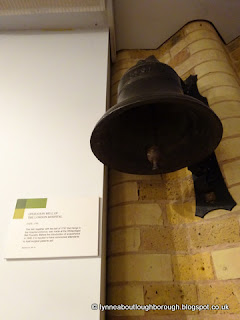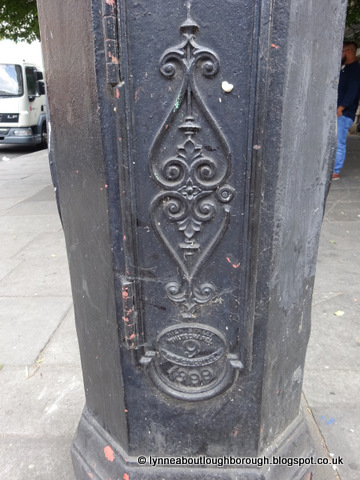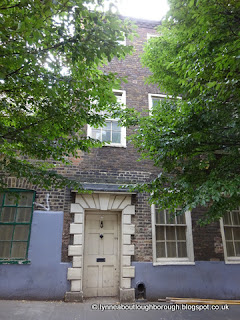This past week I've been to Woodhouse Eaves church again, and admired the Taylor's bell in the porch! I was actually there to listen to a friend present some of the research done on the architect of the church, and was reminded of my recent visit to London, by mention of the Whitechapel Bellfoundry.
When I went to London for my son's graduation, we popped into the local medical museum, The Royal London Hospital Museum, as we were aware they had some significant material. On entering the crypt of the former church the first display we came across was a bell. According to the information board:
"Operation bell of the London Hospital. Date: 1791.This bell, together with the bell of 1757 that hangs in the Hospital entrance, was made at the Whitechapel Bell Foundry. Before the introduction of anaesthetics in 1846, it is reputed to have summoned attendants to hold surgical patients still."
Further into the museum we saw the replica skeleton of Joseph Herrick, otherwise known as the Elephant Man. This was here because the hospital had done much investigation of his condition during his lifetime.
Once we'd been around all the museum, we headed off down the length of Whitechapel Road to get into Central London.
Along the way we spotted various things of interest, but none of greater interest than the Whitechapel Bell Foundry buildings! Founded in 1570, the Whitechapel Bell Foundry moved to its buildings on Whitechapel Road in 1739, has the honour of being the oldest British manufacturing business. Since 1904 the business has been owned by the Hughes family, but in 2016 they sold the Grade II listed buildings and the foundry finally closed for business in May 2017.
Some of the most well-known bells that were cast at Whitechapel include the Liberty Bell, cast in 1752, and in 1856 Big Ben, although this had to be re-cast in 1858 because it developed a crack during the testing process. More recently, Whitechapel designed the bell which was used to start the 2012 Olympics, although because it was too big to be cast in their foundry, it was actually cast in The Netherlands. They did, however, cast the bell for the leading barge on the Thames for the Queen's Jubilee Pageant in 2012. From the markings on the photo below, Whitechapel did not just cast bells: this is the base of a lamppost in the vicinity.
When we walked past the foundry buildings - well, ok, we didn't just walk past, we lingered for quite some time - the buildings did not appear to be in use, but nonetheless seemed well-kept. I do wonder what will happen to them. Of course, this does mean that Taylors Bell Foundry, at one time financially vulnerable, and its buildings still in need of a degree of renovation, is now the sole remaining bell foundry in the UK. As we've already read, its bells can be found across the globe, and can its renovation work on bells that may have been cast in different foundries.
Regarded as a relative newbie, the company has a direct link from the Leicester bell founder, Johannes de Stafford who seems to have been casting bells earlier than 1338, although the Taylor family didn't become involved until 1784, first coming to Loughborough in 1839, moving to the present site in 1859. One of Taylors most notable bells is the Great Paul bell which was cast for St Paul's Cathedral in London. Anyway, long may Taylors continue!
And here I feel I must stop!
You are welcome to quote passages from any of my posts, with appropriate credit. The correct citation for this looks as follow:
Dyer, Lynne (2018). Whitechapel and Taylors bell foundries. Available from: https://lynneaboutloughborough.blogspot.com/2018/08/whitechapel-and-taylors-bell-foundries.html [Accessed 19 August 2018]
Take down policy:
I post no pictures that are not my own, unless I have express permission so to do. All text is my own, and not copied from any other information sources, printed or electronic, unless identified and credited as such. If you find I have posted something in contravention of these statements, or if there are photographs of you which you would prefer not to be here, please contact me at the address listed on the About Me page, and I will remove these.
Thank you for reading this blog.
Lynne












No comments:
Post a Comment
If you have found this post interesting or have any questions about any of the information in it do please leave a comment below. In order to answer your question, I must publish your query here, and then respond to it here. If your information is private or sensitive, and you don't wish to have it on public display, it might be a better idea to email me using the address which is on the About Me page, using the usual substitutions: if you take the email route, our conversation remains private, and is not published on the blog. Thanks for reading the blog.